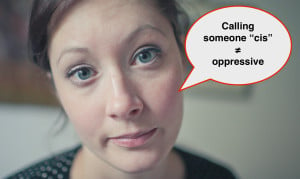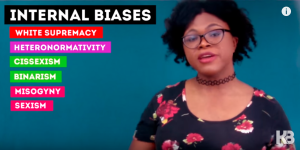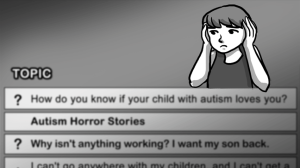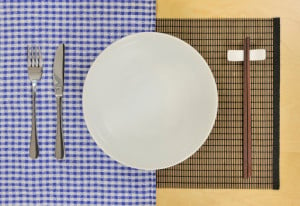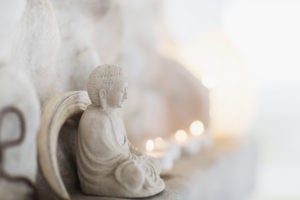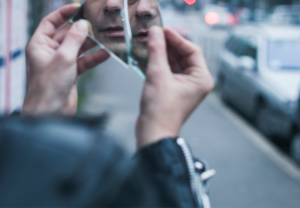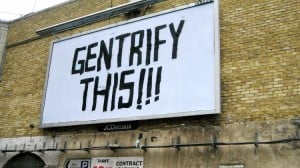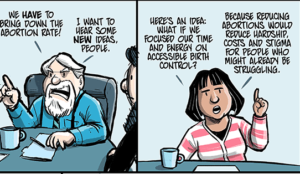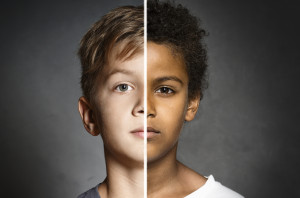Originally published on Ravishly on republished here with their permission.
(Content note: weight loss, diet talk)

Closeup of a person with their head resting against their hand, staring off at something in the distance with a somber expression.
Once upon a time, I counted calories, carbs, and fat. I weighed myself every day, and I exercised for hours at the gym. I viewed my body as the enemy, and I beat it into submission through sheer force of will. I lost a lot of weight, and I kept most of it off. But I am not healthy – and I never will be.
I’m still fat now, but I am “acceptably” fat. My rolls are small enough to hide under a shirt cut just so, and the fat on my back has shrunk enough to make my mild humpback disappear. I can shop in any clothing store and know that the clothes will fit. But I’m still not healthy.
Three years ago, I was diagnosed with mitochondrial disease, a rare genetic disorder that impacts energy production in every cell of the body (except red blood cells). Simply put, my body struggles to produce enough energy to meet its needs, and the impact of these energy shortages can be felt in every system of my body.
There is no treatment for mitochondrial disease. All that we can do is treat the symptoms and wait for science to catch up.
Like many people with a chronic disease, my path to diagnosis was downright ugly. Although my symptoms began in childhood, I wasn’t diagnosed until I was in my early thirties. By the time I finally received my diagnosis, I had pretty much written off modern medicine entirely.
Their misdiagnoses nearly killed me, I gained massive amounts of weight from the very high-dose steroids they put me on to treat a disease I didn’t even have, and I was sick and tired of dealing with doctors who fell back on stress or depression when they ran out of other ideas.
Getting a diagnosis proved to them, once and for all, that I was sick, but that validation was almost immediately tempered by the realization that now there was no treatment left to try.
I had assumed that a diagnosis would bring me new treatment possibilities, but instead doctors simply began chalking everything up to mito and throwing up their hands. In an instant, I was thought of as a lost cause.
I’ve spent the last three years exploring alternative health treatments. While I didn’t expect miracles, I did hope that maybe – just maybe – I could heal myself. I knew that I couldn’t cure my disease, but I hoped that I could at least slow the progression and manage the symptoms. I cut out every conceivable toxin, chemical, and additive from my life; I eliminated grains, dairy, sugar, and GMOs from my diet and even my toiletries.
Hell, I even raise my own backyard chickens.
If health is measured by weight loss, then I am healthier. But the thought of calling a few lost pounds “healthy” is ridiculous to me. Sure, I wanted to be thin. I wanted defined muscles and glowing skin and a fucking pony, too. But my real goal was to heal my body and to stop being sick.
And I didn’t achieve that goal. In fact, I’m in worse health now than I was when I began. It turns out that my DNA doesn’t care what I eat, and that my disease will continue to progress regardless of what I do. I guess that’s why they call it an untreatable progressive disease.
Despite what I’ve been force-fed by society, losing weight didn’t make me healthy. Not every disease can be cured – not every disease even has a treatment.
There is no battle to wage and there is certainly nothing left to control. The only thing to fight is my own cells. And that means there is nothing to fight at all.
It also means that the big, heavy stomach that hangs down over my crotch doesn’t seem so important anymore. I see it, and I remember when my children grew inside of it, and I think that I’m pretty lucky to have been able to be their mother. I see the cellulite on my thighs and it is dimpled and pocked, but I remember when I climbed the stairs of Santorini and rode a camel in Cairo with those thighs.
They held me up then, and they were strong enough.
I am not strong anymore. My legs tremble as I get up from a chair. I am not quite “thin enough,” but I am most assuredly not healthy enough. And, at its core, that is supposed to be the goal.
That’s why everyone is so terrified of being fat. Being fat means you’re unhealthy, and being unhealthy is the ultimate failure.
Or at least that’s what I see, hear, and read day in and day out, and those words are why I carefully applied a decal to my bathroom mirror that reminds me that I am beautiful every time I look in the mirror.
When there is nothing left to fight, there is nothing left to do but grieve. I used to think that I would grieve my health and my lost future, and that I would eventually come to accept it. I believed that I would come to terms with this disease and what it has stolen from me, and that I would find peace.
Eventually, I did. Sort of. What I didn’t realize was that grief is a never-ending cycle. I spend more time in acceptance as the years go by, but I still find myself thrown into anger or denial when I least expect it. Each time, I claw my way back to acceptance, but now I know that it won’t be the last time I make that journey.
Accepting an unhealthy body means that there is no such thing as an ideal anymore. I don’t bother comparing myself to models and actresses or even that fashionable woman walking down the street. Those people are like aliens – and in a way, my decline has removed many of the body image pressures of my youth.
Instead, I find myself envying the chubby woman I see jogging through the park, or even the mother I see playing with her kids at the beach. I mourn lost function, not form. But acceptance means recognizing that there is no pot of gold at the end of this rainbow. The health I have today is tenuous. What seems unbearable now will seem preferable by this time next year.
Society tells me that there is no beauty in being broken. Being unhealthy is a failure, and it is something to fight against at all costs. Certainly, I know that life was different when I could still climb those stairs and dance all night, but is my broken body completely without value now? When I live today, in this moment I am given, I don’t think it is.
After all, someone has always been healthier than me; some people scale mountains and run marathons and kick impossible goals. The only difference now is how many people are healthier than I am. I fall in a very different place on that spectrum than I once did.
As we get older, most of us will lose our health. The struggles I have now are common to those in their 70s and 80s. I am many years ahead of the curve, but I know that my friends and family will find themselves here someday, too. Their skin will sag like mine, and their muscles, too, will tremble and atrophy. They will lose their ability to run and jump and dance – and eventually they will die.
They don’t know what that will feel like right now, and so they count calories, carbs, and fat like I once did, and scrutinize their faces for wrinkles, and view their bodies only in terms of how they look. It is a privileged vantage point, even if they don’t recognize it now, but someday they will understand the privilege of their youth.
I look in the mirror now and I see the ravages of disease in my gray hair, drooping eyelids, bowed legs, and twisted spine. I see my sagging arms and the rolls of fat around my abdomen, but I also see a body that is still standing. It is a body that is broken on a cellular level, and it struggles to provide for its basic needs, but it keeps on struggling. It hasn’t given up, and so I haven’t given up.
I do not fight it anymore – it does its own fighting. Instead, I nurture it. I wrap it in love and compassion, and I recognize that my body is doing the best it can. And while its best won’t win races or even qualify as “healthy,” it’s good enough for today.
In terms of learning to accept our bodies, there is no such thing as healthy or unhealthy. There is certainly no magical line that constitutes value and worth. Our bodies are our vessels, and loving them and ourselves means treating those vessels with care. I eat well and minimize harm today because I love my body, not because I expect to change it.
Through time, I have learned to find beauty in my body’s refusal to give up, but I also recognize that eventually all of our bodies reach their limits. There is beauty and grace in acknowledging and accepting that, too.
Some of my medical treatments cause weight gain. I railed against them for a while. I’ve already lost my health, so why should I have to lose the weight loss I struggled so hard to achieve, too? But, eventually, I couldn’t help but concede that my health mattered more than any amount of fat.
Now I watch the scale slowly climb up, and my jeans get snug, but I also remember what it is like to make it through a grocery store without nearly passing out, and that is health for me. It is the best my body can do, and today I am grateful for that.
More from Ravishly:
- I Am Body Positive, Just Not When It Comes To Myself
- I Went To 3 Doctors Before Finding Someone Who Believed In My Illness
- An Apology To Myself At 500 Pounds
[do_widget id=’text-101′]
Jody Allard is a former techie turned freelance writer living in Seattle. Her online work has appeared on Time, xoJane, and Offbeat Home, among others. She writes primarily about food, family, mothering, and life with a chronic illness.
Search our 3000+ articles!
Read our articles about:
Our online racial justice training
Used by hundreds of universities, non-profits, and businesses.
Click to learn more





